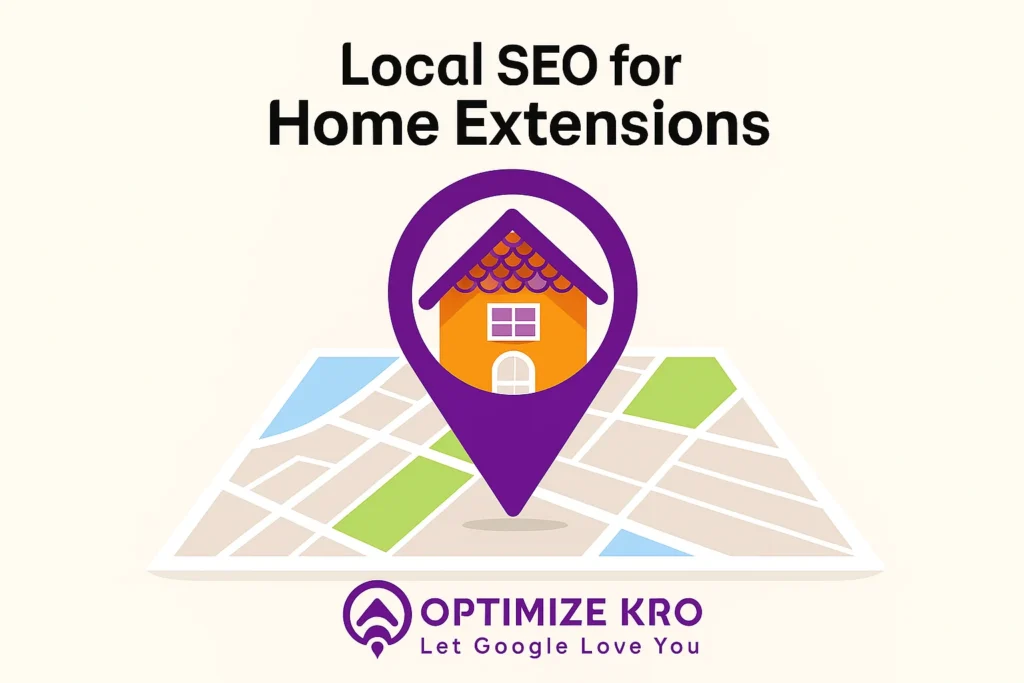Imagine this: a homeowner is dreaming about adding a new room, an open-plan kitchen, or an extra floor. The first thing they’ll do? Whip out their phone and type “home extension contractors near me.” That’s where local SEO comes in. If your home extension business doesn’t show up in those searches, you’re losing out to your competitors—plain and simple.

This guide will walk you through everything you need to know about local SEO for home extensions, so you can attract more customers and grow your business.
- What is Local SEO?
- Why Local SEO is Critical for Home Extensions
- Benefits of Local SEO for Home Extension Companies
- What Our Clients Say
- Understanding Local Search Behavior
- Google Business Profile Optimization
- Keyword Research for Home Extensions
- On-Page SEO Strategies
- Content Marketing for Local SEO
- Building Local Citations and Directories
- Online Reviews and Reputation Management
- Backlink Strategies for Local SEO
- Mobile Optimization for Local Searches
- Tracking and Measuring Local SEO Success
- Common Local SEO Mistakes to Avoid
- Future Trends in Local SEO for Home Extension Services
- Conclusion
What is Local SEO?
Local SEO (Search Engine Optimization) is the process of optimizing your business online to appear in local search results. Think of it as a digital signboard that tells nearby homeowners, “Hey, we’re right here and we can help!”
Unlike general SEO, local SEO focuses specifically on location-based searches—the type most homeowners use when looking for extension services.
Why Local SEO is Critical for Home Extensions
Homeowners don’t usually search for “best home extension company in the world.” Instead, they search for contractors in their area. If you’re not visible locally, you’re missing the very people who are ready to hire.
Local SEO ensures you show up at the right time, in the right place—when homeowners are actively searching for you.
Read More:
Local SEO for Home Additions
Local SEO for Handyman Services
Local SEO for Remodeling Garage Contractors
Local SEO for Bathroom Remodeling Company
Benefits of Local SEO for Home Extension Companies
- More leads and inquiries: Appear in front of local homeowners ready to start projects.
- Better trust and credibility: High Google rankings = customer trust.
- Compete with bigger firms: Local SEO levels the playing field against national companies.
What Our Clients Say
Trusted by contractors and local businesses for proven Local SEO Services.
John M. – General Contractor
“These guys transformed my Google Maps ranking. More calls, more local leads, and better visibility!”
Sarah L. – Roofing Business
“Within 3 months, my business went from page 3 to the top 3 listings. Highly recommend their Local SEO service!”
David K. – Plumbing Services
“Affordable and effective SEO. My local service calls doubled in less than 90 days.”
Understanding Local Search Behavior
Homeowners rely on quick searches like:
- “Home extensions near me”
- “Kitchen extension contractor in [city]”
- “Loft conversion [town name]”
These searches are intent-driven—people aren’t browsing, they’re ready to book.
Google Business Profile Optimization
Your Google Business Profile (GBP) is the backbone of local SEO. Here’s how to optimize it:
- Choose accurate categories like home extension contractor or remodeling service.
- Upload real project photos.
- Keep your business hours updated.
- Collect and respond to customer reviews.
A well-optimized GBP gets you into the coveted Google Map Pack, which attracts most clicks.
Keyword Research for Home Extensions
Keywords fuel local SEO. Focus on:
- Location-based keywords: “Home extension in Manchester”
- Long-tail keywords: “Affordable kitchen extension services in Leeds”
Use tools like Google Keyword Planner, SEMrush, or Ahrefs to find terms your audience is searching for.
On-Page SEO Strategies
Optimize your website pages by:
- Adding location keywords to titles, headers, and meta descriptions.
- Including your city or region in service pages.
- Writing clear, customer-friendly copy that speaks directly to homeowners.
Content Marketing for Local SEO
Content is your chance to educate and attract. Some ideas:
- Blog posts like “5 Things to Know Before a Loft Extension in [City]”
- Case studies showcasing completed projects
- Local guides (e.g., “Planning Permission Rules for Home Extensions in [City]”)
This builds authority and helps you rank higher.
Building Local Citations and Directories
Consistency is key. Your Name, Address, Phone number (NAP) should be identical across:
- Yelp
- Houzz
- Local chambers of commerce directories
Citations build trust with search engines, boosting your rankings.
Online Reviews and Reputation Management
Positive reviews = social proof. Encourage happy clients to leave reviews on Google, Houzz, and Facebook.
For negative reviews? Respond professionally. Show you care about resolving issues.
Backlink Strategies for Local SEO
Quality backlinks can skyrocket your authority. Ideas:
- Collaborate with local architects or suppliers for link exchanges.
- Sponsor community events.
- Pitch stories about your projects to local media.
Mobile Optimization for Local Searches
Most “near me” searches happen on phones. Make sure your site is:
- Fast-loading
- Mobile-friendly
- Easy to navigate
If it’s not, homeowners will bounce to your competitors.
Tracking and Measuring Local SEO Success
Measure your results with tools like:
- Google Analytics – track traffic and conversions.
- Search Console – see search queries bringing in visitors.
- Call tracking software – measure leads directly from local SEO.
Common Local SEO Mistakes to Avoid
- Keyword stuffing (unnatural use of keywords).
- Ignoring customer reviews.
- Having inconsistent NAP details across platforms.
Future Trends in Local SEO for Home Extension Services
- Voice search: “Hey Google, find home extension contractors near me.”
- AI-driven results: Google’s AI is learning user behavior, making relevancy more important than ever.
Conclusion
Local SEO isn’t just another marketing strategy—it’s a lifeline for home extension businesses. By showing up when homeowners are actively searching, you position yourself as the go-to expert in your area. Start with your Google Business Profile, optimize your website, collect reviews, and track your results. Before long, your phone will be buzzing with new leads.
Typically, it takes 3–6 months to see noticeable improvements, depending on competition and consistency.
Yes! A website adds credibility, helps with ranking, and provides a hub for your services.
Google Business Profile optimization and consistent NAP details are key.
Indirectly, yes. Social media boosts brand awareness and can drive traffic that improves SEO.
Ask satisfied customers directly, send follow-up emails, and make it easy with direct review links.

Gulfam Qamar is a seasoned Local SEO expert with a proven track record of helping businesses boost their online visibility and dominate local search results. With deep expertise in Google Business Profiles, on-page optimization, and local citation strategies, Gulfam helps brands connect with nearby customers and grow sustainably. When he’s not optimizing websites, he’s sharing actionable SEO tips and insights to empower small businesses in the digital space.

